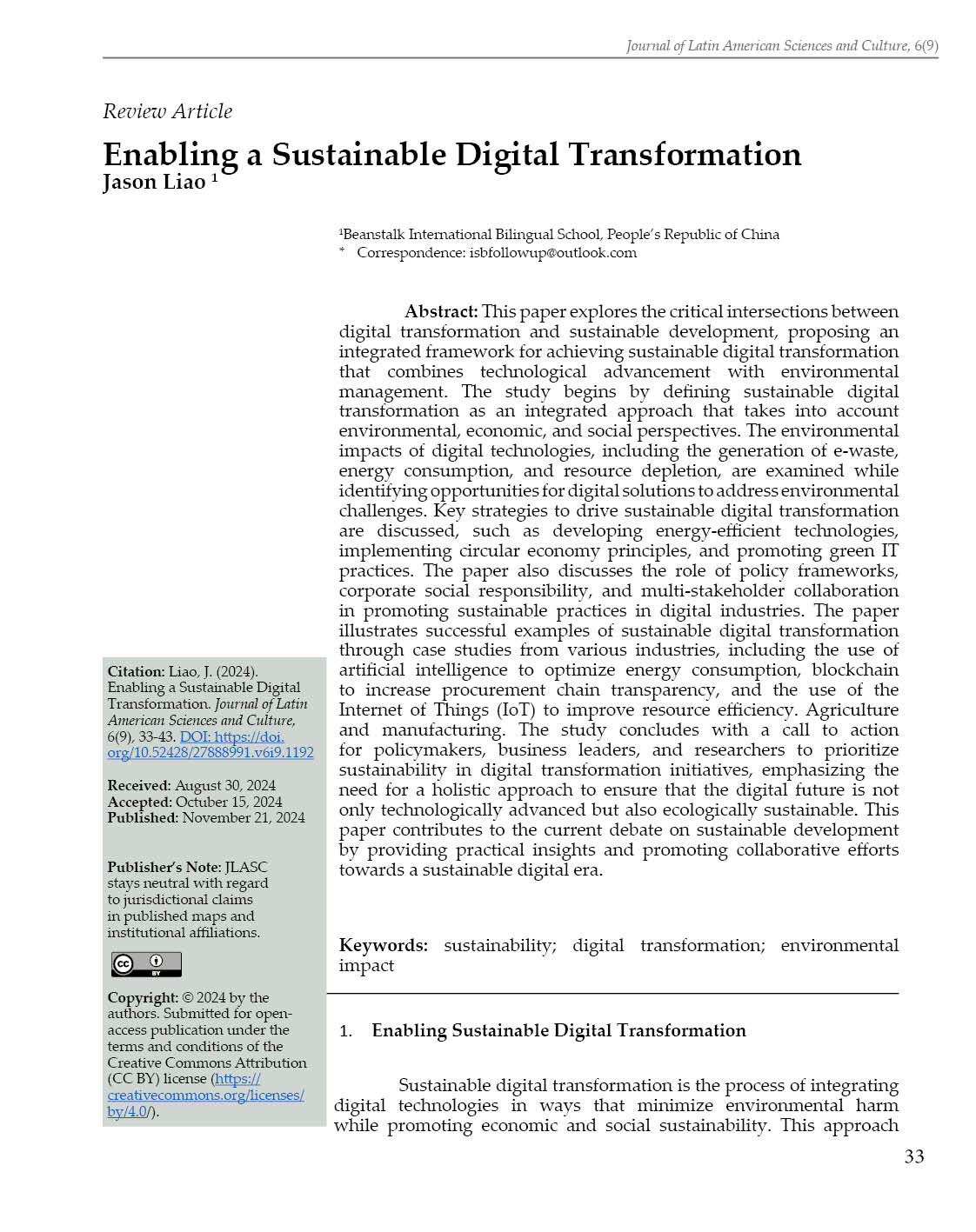Enabling a Sustainable Digital Transformation
DOI:
https://doi.org/10.52428/27888991.v6i9.1192Keywords:
sustainability, digital transformationAbstract
This paper explores the critical intersections between digital transformation and sustainable development, proposing an integrated framework for achieving sustainable digital transformation that combines technological advancement with environmental management. The study begins by defining sustainable digital transformation as an integrated approach that takes into account environmental, economic, and social perspectives.
Downloads
References
International Energy Agency. (2021). Data centers and energy usage. International Energy Agency. https://www.iea.org/reports/data-centers-and-energy-usage
United Nations. (2015). Sustainable Development Goals. United Nations. https://sdgs.un.org/goals
United Nations Conference on Trade and Development. (2019). Digital economy report 2019: Value creation and capture - Implications for developing countries. United Nations. https://unctad.org/webflyer/digital-economy-report-2019
Berkhout, F., & Hertin, J. (2004). De-materialising and re-materialising: Digital technologies and the environment. Futures, 36(8), 903-920. https://doi.org/10.1016/j.futures.2004.01.003
https://doi.org/10.1016/j.futures.2004.01.003 DOI: https://doi.org/10.1016/j.futures.2004.01.003
European Commission. (2020). Shaping Europe's digital future. European Union. https://ec.europa.eu/digital-strategy
International Energy Agency. (2021). Data centers and energy usage. International Energy Agency. https://www.iea.org/reports/data-centers-and-energy-usage
Forti, V., Balde, C. P., Kuehr, R., & Bel, G. (2020). The global e-waste monitor 2020: Quantities, flows, and the circular economy potential. United Nations University, United Nations Institute for Training and Research, International Telecommunication Union, and International Solid Waste Association.
Graedel, T. E., & Reck, B. K. (2016). Six years of criticality assessments: What have we learned so far? Journal of Industrial Ecology, 20(4), 692-699. https://doi.org/10.1111/jiec.12305
https://doi.org/10.1111/jiec.12305 DOI: https://doi.org/10.1111/jiec.12305
Jones, N. (2018). How to stop data centres from gobbling up the world's electricity. Nature, 561(7722), 163-166. https://doi.org/10.1038/d41586-018-06610-y
https://doi.org/10.1038/d41586-018-06610-y DOI: https://doi.org/10.1038/d41586-018-06610-y
Ellen MacArthur Foundation. (2013). Towards the circular economy: Economic and business rationale for an accelerated transition. Ellen MacArthur Foundation.
Koomey, J. G. (2011). Growth in data center electricity use 2005 to 2010. Analytics Press.
Murugesan, S. (2008). Harnessing green IT: Principles and practices. IT Professional, 10(1), 24-33. https://doi.org/10.1109/MITP.2008.10
https://doi.org/10.1109/MITP.2008.10 DOI: https://doi.org/10.1109/MITP.2008.10
Brazilian Ministry of the Environment. (2010). Política Nacional de Resíduos Sólidos. Retrieved from http://www.mma.gov.br/estruturas/253/_arquivos/Lei_12305_72.pdf
Government of India. (2015). Digital India: Power to Empower. Retrieved from https://www.digitalindia.gov.in/
Huber, F., Kirchler, M., & Sponhauer, V. (2017). Sustainable digital transformation: The role of policy and corporate social responsibility. Journal of Cleaner Production, 168, 834-846. https://doi.org/10.1016/j.jclepro.2017.09.165
https://doi.org/10.1016/j.jclepro.2017.09.165 DOI: https://doi.org/10.1016/j.jclepro.2017.09.165
Jack, W., & Suri, T. (2011). Mobile money: The economics of M-Pesa. National Bureau of Economic Research. https://doi.org/10.3386/w16721
https://doi.org/10.3386/w16721 DOI: https://doi.org/10.3386/w16721
McKinsey & Company. (2018). Artificial intelligence in smart grids: Optimizing energy use for sustainability. McKinsey Global Institute.
Saberi, S., Kouhizadeh, M., Sarkis, J., & Shen, L. (2019). Blockchain technology and its relationships to sustainable supply chain management. International Journal of Production Research, 57(7), 2117-2135. https://doi.org/10.1080/00207543.2018.1533261
https://doi.org/10.1080/00207543.2018.1533261 DOI: https://doi.org/10.1080/00207543.2018.1533261
Schot, J., & Steinmueller, W. E. (2018). Three frames for innovation policy: R&D, systems of innovation and transformative change. Research Policy, 47(9), 1554-1567. https://doi.org/10.1016/j.respol.2018.08.011
https://doi.org/10.1016/j.respol.2018.08.011 DOI: https://doi.org/10.1016/j.respol.2018.08.011
Wolfert, S., Ge, L., Verdouw, C., & Bogaardt, M. J. (2017). Big data in smart farming - A review. Agricultural Systems, 153, 69-80. https://doi.org/10.1016/j.agsy.2017.01.023
https://doi.org/10.1016/j.agsy.2017.01.023 DOI: https://doi.org/10.1016/j.agsy.2017.01.023

Downloads
Published
Issue
Section
License
Copyright (c) 2024 Jason Liao

This work is licensed under a Creative Commons Attribution 4.0 International License.
Copyright and Licensing Agreement
Authors who submit and publish their work with this journal agree to the following terms:
-
Copyright and License: Authors retain the copyright of their published work. By submitting the manuscript, they grant the journal the non-exclusive right of first publication. The work is simultaneously licensed under a Creative Commons Attribution 4.0 International (CC BY 4.0) License.
-
Permissions Under CC BY 4.0: This license permits any third party to share, adapt, and redistribute the material for any purpose, including commercial use, provided that appropriate credit is given. Attribution must include citation of the author(s), the article title, the journal name, and the original publication details, along with a link to the CC BY 4.0 license.
-
Author's Rights of Reuse: Authors may enter into separate, additional contractual agreements for the non-exclusive distribution of the journal's published version of the article. This includes depositing it in an institutional repository or including it in a collected volume, provided that clear and proper attribution is given to its initial publication in this journal.
-
Encouragement of Early Sharing: Authors are expressly permitted and encouraged to disseminate their work online prior to and during the submission process. Sharing preprints in community repositories or on personal websites fosters scholarly exchange and can lead to increased early citation and collaboration.








